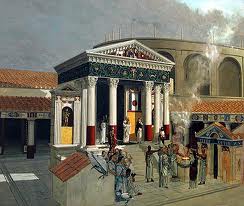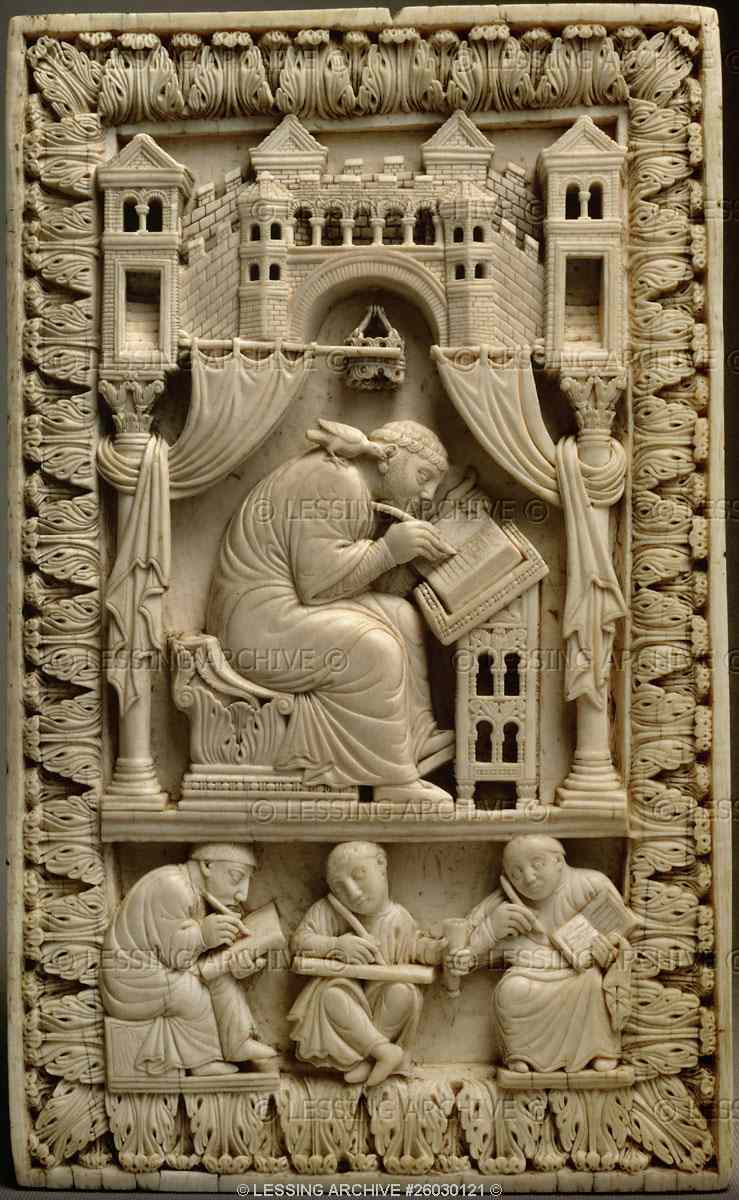“But the advances made by Jewish theology were more dangerous than the disorder of the streets and the robber.”
—Theodor Mommsen, in Provinces of the
Roman Empire, from Caesar to Diocletian
1.
Constantine the Great, also Saint Constantine (Emperor from 306 to 337 C.E.) has been described as a monster even for the standards of the ancient world. Catholic historian Paul Johnson wrote about him: “Constantine had no respect for human life, and as emperor he executed his eldest son, his own second wife, his favorite sister’s husband.”
The Roman Emperor inaugurated the Christianization of public life. He sanctioned with death penalty, instead of the traditional exile, those who published anonymous libels. His dispositions for death penalty were extremely severe, and I would like to know if it is true what I have read in a book: that under Constantine tortures such as pouring molten lead into the mouths of some women who had violated certain laws accompanied death penalty.
In 330 Constantine condemned the Neoplatonic School. Sopater of Apamea, a distinguished Neoplatonist philosopher was one of many who were put to death by Constantine.
Under Constantine’s reign pagans were referred to as “foolish,” “people without morals,” and their religion “a hotbed of discord,” “a fatal error,” “empire of darkness,” and “madness that has ruined whole nations.” However, while Julian said that Constantine was a “destroyer of ancient and venerable constitutions,” throughout the centuries Constantine has been much praised by Christian apologists.
Constantine was the first Roman Emperor who ordered the destruction of the intellectual work of Porphyry, the best mind of his age, whose work I briefly discussed in a recent entry. During his campaign of looting of the sculptures and shrines, Constantine did not even respect the famous tripods for the pythia of the sanctuary of Apollo at Delphi. The historian Kornemann notes that this was “a larceny of works of art never seen in Greece before.”
After Constantine’s death, his sons Constans and Constantius shared the empire of their father for some time, and only aggravated the all-out, state-sponsored assault on the Hellenic culture.
 Under Constans the first destructions, not only loots, of the temples themselves were perpetrated, albeit sporadically. Under Constantius, who appears well described in Gore Vidal’s novel, the most fanatic Christians attacked the altars and temples. The deacon Cyril of Heliopolis, for example, became famous with his actions. The Arethusa in Syria, the priest Marco demolished an ancient shrine. At Caesarea in Cappadocia, the Christian community razed a temple of Zeus, the patron of the city, and another of Apollo.
Under Constans the first destructions, not only loots, of the temples themselves were perpetrated, albeit sporadically. Under Constantius, who appears well described in Gore Vidal’s novel, the most fanatic Christians attacked the altars and temples. The deacon Cyril of Heliopolis, for example, became famous with his actions. The Arethusa in Syria, the priest Marco demolished an ancient shrine. At Caesarea in Cappadocia, the Christian community razed a temple of Zeus, the patron of the city, and another of Apollo.
Under the reigns of both Constantius and Constans, Firmicus Maternus preached the looting: “Out of all pagan temples ornaments! The mint and the crucible with the metal of the idolatrous statues, melt them in the heat of the flames!” In one of his pamphlets Firmicus incited extermination of the pagan cults, including those of Dionysus-Bacchus and Aphrodite.
But most of the temples of the classical world were still upright. The Christian agitator declaimed: “Take away without fear the ornaments of the temples! Melt the figures of gods and coin your money! The Lord has called to the task of annihilate all temples!” Always invoking the god of the Jews, this Sicilian lawyer from upper nobility claimed being an heir of biblical hecatombs as no Christian had done before.
In a subsequent post we shall see what happened to our civilization after this war of cultural extermination inspired by the cult that repudiated the Greco-Roman Gods, and adored instead the zealous, “no other gods before me” god of the Jews.
(Source: Kriminalgeschichte des Christentums, Vol. I, 1986, by Karlheinz Deschner)
2.
“In discussing Barbarism and Christianity I have actually been discussing the Fall of Rome.”
—Edward Gibbon
All Roman emperors after Julian would be Christians. Theodosius “the Great” and the subsequent emperors only completed the destruction of the Greco-Roman spirit that had started with Constantine and his sons. Not only the magnificent temples of worship of antiquity were destroyed almost everywhere, irreplaceable buildings of artistic value that transmitted like nothing else the soul of Hellenic culture, but even until the tenth century the fanatical worshipers of the god of the Jews continued smashing the statues that depicted the divinity of Man like no other art before.
But the most tremendous destruction occurred in the field of education. From the time of St. Paul at Ephesus, church censorship was devoted to the burning of books. After Julian the flourishing book trade disappeared in antiquity, whilst the activity of the monasteries was purely receptive. In the universities the hypertrophy of Aristotelianism aborted any possibility of independent research. In the Middle Ages what I call “real history” was completely unknown, and the sciences were drowned.
With this knowledge I venture to answer a question that has perplexed historians since the Enlightenment: What caused the fall of Rome?
German professor Alexander Demandt published a collection of two hundred theories on why Rome fell. Everything has been postulated—from lead poisoning and environmental degradation to Toynbee and many others’ diverse economic explanations—except the most obvious explanation. The simple truth is that the spirit of an alien, Semitic god undermined the soul of Classical Antiquity. After all, Gibbon himself assigned a major portion of the responsibility for the loss of civic virtue in Rome, and the ensuing decay of the Roman Empire, to the influence of Christianity. I would go further and claim that those unfamiliar with this work, which remains a literary landmark, lack the framework to understand why the Jew-god worshipers and their secular offspring are responsible for the ongoing Fall of the West. (Yes: I am blaming the Christians and the secular Christians who tolerate the Jews far more than I blame the Jews themselves.)
It is true that Rome’s eastern half survived almost a thousand years, until the Muslim conquests. But it was already a thoroughly petrogenic culture under the Medusan spell of Christian dogma. In fact, with its mongrelized citizens the population looked very different from the Latin Rome of the Republic.
3.
“The Skin of our Teeth” was the very first chapter of Kenneth Clark’s 1969 Civilisation. About the loss of historical consciousness, in the first chapter of Civilisation, Clark said:
Civilized man, or so it seems to me, must feel that he belongs somewhere in space and time; that he consciously looks forward and looks back. And for this purpose it is a great convenience to be able to read and write.
For over five hundred years this achievement was rare in Western Europe. It is a shock to realise that during all this time practically no lay person, from kings and emperors downwards, could read or write.
St. Gregory, who looks so intensely devoted to scholarship on a tenth century ivory, is credited with having destroyed many volumes of classical literature, even whole libraries, lest they seduced men’s minds away from the study of holy writ. And in this he was certainly not alone. What with prejudice and destruction, it’s surprising that the literature of pre-Christian antiquity was preserved at all. And in fact it only just squeaked through. In so far as we are the heirs of Greece and Rome, we got through by the skin of our teeth.
(Page 17 of the printed, Harper & Row book.)

7 replies on “The fall of Rome”
I can sympathize with your sentiments, but I feel you haven’t expressed them well.
I read your text like this:
1.Everything has been postulated, except the most obvious idea.
2. The most obvious idea is that the Semitic god undermined Rome.
3. Therefore no one has yet postulated that the Semitic god undermined Rome.
4. But Gibbon himself wrote that the Semitic god undermined Rome.
It’s a good post overall, but I think it could be edited for clarity.
Well, Gibbon did not say that “the Semitic god undermined Rome”, only that Christianity weakened Roman civil virtues. My POV is much more aggressive than Gibbon’s, who, having passed away a century before Nietzsche’s death, never read these inflammatory pages.
There is no Semitic God. The joo God is a CONSTRUCT and all you are doing wasting mental energy on debating a CONSTRUCT.
Saintclair
Few Christians deny that Christianity caused the end of the Roman Empire — they are in fact quite proud of it! Because to them, the Roman Empire was evil (in its practice of slavery, in its endless imperialism, in its use of eugenics via exposure, in its opposition to any form of legal egalitarianism, etc).
The question should not be “Did Christianity kill the Roman Empire”, because the answer is yes, it should be “Was the feudal system which followed the end of the Greco-Roman world a benediction or a misery for the Aryan race”.
Personally, I don’t see any advantage to it except the filling of metaphysical voids that pantheism did not succeed in filling.
For the rest, it was a complete disaster that left us completely vulnerable to predators, whether bacterial or human (Jews).
The irony being that Christian resistance to exposure, and the resulting large families, lead themselves to imperialism, and accompanying, slavery.
Well, every single recommendation of the Church produces effects which are the exact reverse of what was wished.
By wanting to create a more humane world, they in fact create a living hell for everybody. The world can only be improved by policies resting on the natural laws, not by policies negating them.
Monotheism was the disaster, the bacteria was the symptom of monotheism. The monotheism of Akhenaten which was centered on Sun worship, ignored the celestial influence of the Moon and the Earth. The monotheism of Akhenaten has been completely misunderstood and politicised into a joo construct, the product of which is the political Talmud and Torah which has been applied to Western Civilization, the result of which is joo Frankenstein SYPHILIZATION.
Akhenaten was correct in identifying the Sun as the primary creative force within the solar system but he ignored the influence of the Moon and the earth because they represent the female principle in creation and the monotheism of Akhenaten only promoted patriarchal (masculine) Monotheism to the exclusion of everything else. This is why the Egyptians ultimately rejected Akhenaten’s monotheism which was Frankensteined into joo SYPHILIZATION.
Saintclair